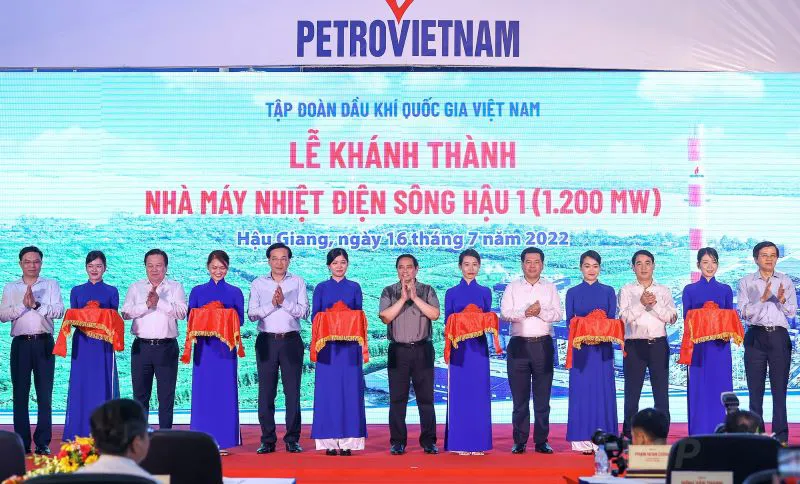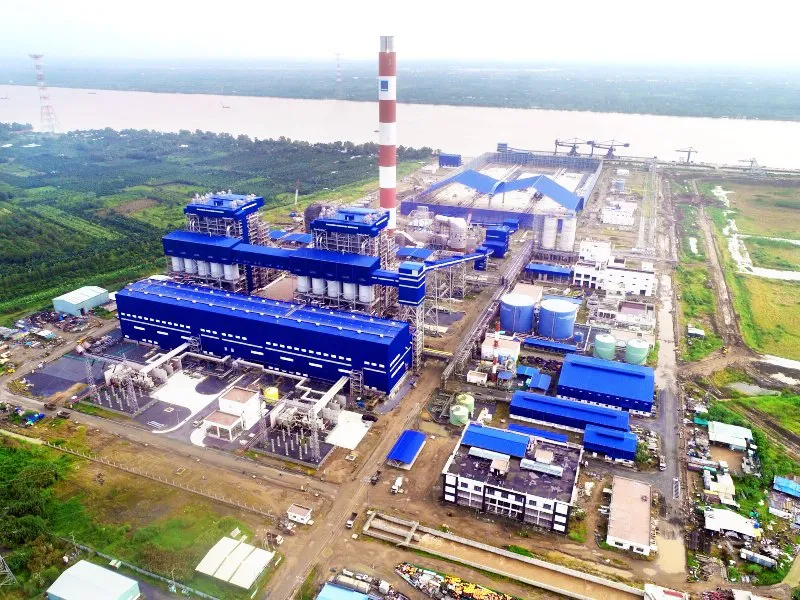US$2-billion coal power plant in Vietnam inaugurated
The plant, which generates approximately 7.3 billion kWh/year, will largely meet the demand for electricity in the Southwestern region.
A coal-fired power plant with a capacity of 1,200 megatwatts (MW) located in the Mekong Delta was inaugurated on July 16 in the attendance of Vietnam’s Prime Minister Pham Minh Chinh.
With an investment of VND43 billion (US$1.85 billion), Song Hau 1 Thermal Power Plant with two turbines will generate roughly 7.3 billion kWh/year, largely meeting the demand for electricity in the Southwestern region.
The plant, whose construction kick-started in May 2015, located in Hau Giang Province was invested and built by Vietnamese investor Vietnam Oil and Gas Group (PetroVietnam) and engineering, procurement, and construction (EPC) contractor Vietnam Machinery Installation Corporation (LILAMA).
| Prime Minister Pham Minh Chinh (C) attends the inauguration ceremony of Song Hau 1 Thermal Power Plant in Hau Giang Province. Photo: VGP |
Addressing the inauguration ceremony, PM Chinh said the operation of the plant strengthened national energy security. He highly appreciated the efforts that the investor and contractors made over the past time to put the plant into operation on schedule in spite of the Covid-19 pandemic and reiterated the importance of building a self-reliant economy with the contributions of major industries and energy transition.
The plant is expected to contribute VND15-20 trillion ($640 million-$850 million) to the annual revenues of the investor which is the second largest electricity producer. Currently, PetroVietnam is operating a number of power plants with a total capacity of 5,400 MW, accounting for 10% of the national electricity output.
Petrovietnam is speeding up power projects using domestic gas sources and liquified natural gas (LNG) coupled with those using solar and offshore wind.
So far, Vietnam’s power capacity reaches more than 76,000 MW, being one of the largest power producers in Southeast Asia.
In the power structure, the proportion of coal power remains high. In the first four months of this year, coal-fired power was 39 billion kWh, accounting for 45.6% of the total power output, followed by hydropower with 25.9%, renewable energy with 15.4%, and gas-fired power 12.2%.
In the Power Development Plan VIII (PDP8), Vietnam targets to lower coal power to 9.6% and increase renewables to more than 50% by 2045.
| Overview of Song Hau 1 Thermal Power Plant. Photo: LILAMA |
Commenting on Vietnam’s net-zero commitments by 2050, Jacqueline Tao, Asia Expert at TransitionZero, said Vietnam surprised observers with an ambitious goal to achieve net-zero by 2050, alongside an equally unexpected commitment to phase out coal by 2040.
“Compared to other Southeast Asian countries with similar net-zero goals, Vietnam’s target is bold, often coming with fewer caveats than its similarly coal-reliant neighbors,” Jacqueline Tao said, noting that “With energy sector emissions accounting for the bulk of the country’s emissions (~70%), Vietnam’s ability to meet its net-zero target will depend heavily on its power sector decarbonization,” she told The Hanoi Times.
Jacqueline Tao said Vietnam’s net-zero ambition can only be achieved if it succeeds in its commitment to phasing out coal. As a signatory to the Global Coal to Clean Power Transition pact, Vietnam has committed to stop building new coal plants.
Sharing the same idea, Durand D’souza said Vietnam should aim to shut down all coal power plants gradually before 2040 with a phaseout date for each power plant. It should also cancel all coal projects under construction or in development. He explained that a continued build-out of the coal fleet will result in high stranded asset risk as new coal plants will be unable to recoup their initial capital costs before they are retired.
In this regard, failure to abandon new coal projects will saddle Vietnam with unnecessary debt and higher electricity prices, making net-zero a harder challenge, and leaving its industry less competitive globally, he shared with The Hanoi Times.
To pursue the low-carbon path, the Government of Vietnam is on its way to restructuring the energy sector with the encouragement of the private sector to invest in renewable energy while managing large emitters.




![[Net-zero strategy] Which way is possible for Vietnam’s net zero journey?](https://cdn-media.hanoitimes.vn/2022/01/30/GREEN_GROWTH.jpg?w=480&h=320&q=100)









